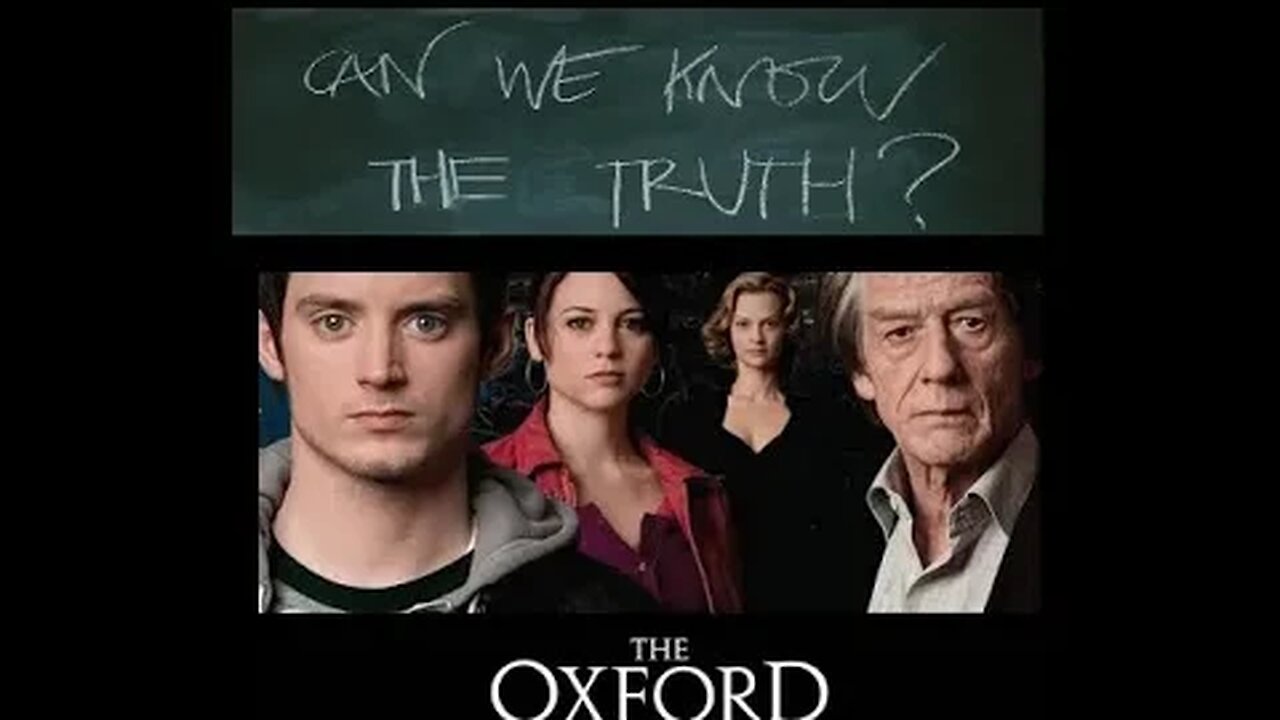Premium Only Content

Can we know the truth? Elijah Wood vs. John Hurt (Wittgenstein)
The Oxford Murders 2008 K-13 1h 48m
Elijah Wood as Martin
John Hurt as Arthur Seldom
Leonor Watling as Lorna
Jim Carter as Inspector Petersen
Arthur Seldom: There is no way of finding a single absolute truth, an irrefutable argument which might help answer the questions of mankind. Philosophy, therefore, is dead, because whereof we cannot speak, thereof we must be silent.
Martin: I believe in the number pi.
Arthur Seldom: I'm sorry, I didn't understand you. Uh, what was it you said you believed in?
Martin: In the number pi, in the golden section, the Fibonacci series. The essence of nature is mathematical. There is a hidden meaning beneath reality. Things are organized following a model, a scheme, a logical series. Even the tiny snowflake includes a numerical basis in its structure, therefore, if we manage to discover the secret meaning of numbers, we will know the secret meaning of reality.
Arthur Seldom: Since man is incapable of reconciling mind and matter, he tends to confer some sort of entity on ideas because he cannot bear the notion that the purely abstract only exists in our brain. "The beauty and harmony of a snowflake" - how sweet. "The butterfly that flutters his wings and causes a hurricane on the other side of the world" - we've been hearing about that damn butterfly for decades, but who has been able to predict a single hurricane? Nobody! Tell me something. Where is the beauty and harmony in cancer? What makes a cell suddenly decide to turn itself into a killer, metastasis, and destroy the rest of the cells in a healthy body? Does anybody know? No! Because we'd rather think of snowflakes and butterflies than of pain, war, or that book. Why? Because we need to think that life has meaning, that everything is governed by logic and not by mere chance. If I write 2 then 4 then 6, then we feel good because we know that next comes 8. We can foresee it. We are not in the hands of destiny. Unfortunately, however, this has nothing to do with the truth. Don't you agree? This is only fear. Sad... but there you go.
Arthur Seldom: "The butterfly that flutters its wings and causes a hurricane on the other side of the world." Sound familiar? Are you that butterfly, Martin?
The Tractatus Logico-Philosophicus (widely abbreviated and cited as TLP) is a book-length philosophical work by the Austrian philosopher Ludwig Wittgenstein which deals with the relationship between language and reality and aims to define the limits of science. Wittgenstein wrote the notes for the Tractatus while he was a soldier during World War I and completed it during a military leave in the summer of 1918. It was originally published in German in 1921 as Logisch-Philosophische Abhandlung (Logical-Philosophical Treatise). In 1922 it was published together with an English translation and a Latin title, which was suggested by G. E. Moore as an homage to Baruch Spinoza's Tractatus Theologico-Politicus (1670).
The Tractatus is written in an austere and succinct literary style, containing almost no arguments as such, but consists of altogether 525 declarative statements, which are hierarchically numbered.
The Tractatus is recognized by philosophers as a significant philosophical work of the twentieth century and was influential chiefly amongst the logical positivist philosophers of the Vienna Circle, such as Rudolf Carnap and Friedrich Waismann and Bertrand Russell's article "The Philosophy of Logical Atomism".
Wittgenstein's later works, notably the posthumously published Philosophical Investigations, criticised many of his earlier ideas in the Tractatus.
#ElijahWood #JohnHurt #Wittgenstein #TractatusLogicoPhilosophicus #TLP
#TheOxfordMurders #Number #Pi #π
-
 2:00:20
2:00:20
Glenn Greenwald
13 hours agoThe View from Moscow: Key Russian Analyst Aleksandr Dugin on Trump, Ukraine, Russia, and Globalism | SYSTEM UPDATE #414
123K60 -
 1:10:55
1:10:55
Donald Trump Jr.
10 hours agoBREAKING NEWS: My Father Revokes Biden-Maduro Oil License, LIVE with Maria Corina Machado | Triggered Ep.220
197K195 -
 1:25:29
1:25:29
Sarah Westall
9 hours agoX-Files True History, Project Blue Beam, Cabal Faction War w/ Former FBI Agent John DeSouza
76.4K15 -
 7:03:49
7:03:49
Dr Disrespect
16 hours ago🔴LIVE - DR DISRESPECT - NEW PC VS. DELTA FORCE - MAX SETTINGS
163K27 -
 49:04
49:04
Lights, Camera, Barstool
1 day agoIs The Monkey The Worst Movie Of The Year?? + Amazon Gets Bond
72.5K4 -
 24:19
24:19
Adam Carolla
1 day agoDiddy’s Legal Drama Escalates, Smuggler Caught Hiding WHAT? + Philly Eagles & The White House #news
126K19 -
 10:12
10:12
Mike Rowe
2 days agoClint Hill: What A Man. What A Life. | The Way I Heard It with Mike Rowe
125K17 -
 1:31:52
1:31:52
Redacted News
11 hours agoBOMBSHELL! This is war! FBI whistleblowers reveal Epstein files being destroyed? | Redacted News
195K370 -
 48:55
48:55
Candace Show Podcast
12 hours agoSTOP EVERYTHING. They FINALLY Mentioned ME In The Blake Lively Lawsuit! | Candace Ep 152
168K132 -
 1:02:51
1:02:51
In The Litter Box w/ Jewels & Catturd
1 day agoWhere are the Epstein Files? | In the Litter Box w/ Jewels & Catturd – Ep. 750 – 2/26/2025
113K90